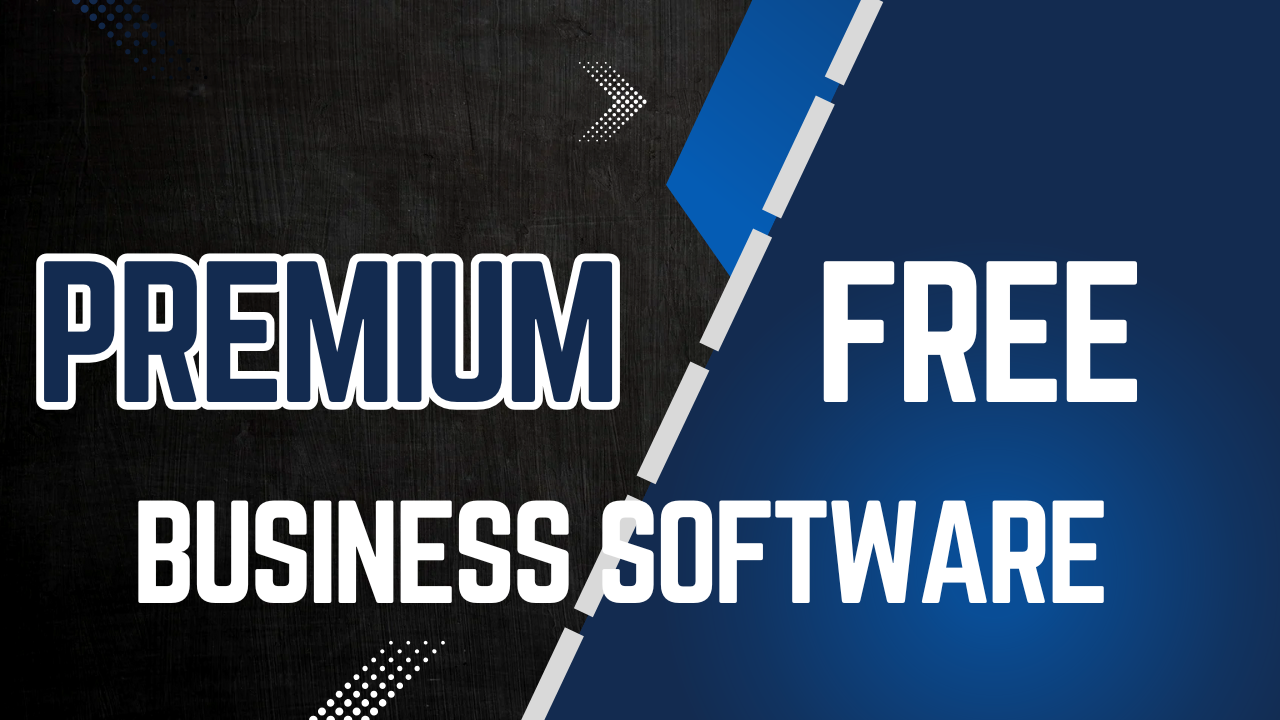Affordable Alternatives to Business Software in 2025

Starting and running a business in 2025 means having access to the right tools – but premium software can quickly drain a startup’s budget. While platforms like Salesforce, Adobe Creative Cloud, and Zoom Pro offer impressive features, they often come with hefty price tags that many early-stage businesses simply can’t justify.
The good news? There are plenty of affordable (and even free) alternatives that offer excellent functionality without compromising quality. In this guide, we’ll walk you through 10 powerful and budget-friendly software tools that can help your business stay productive, organised, and competitive – without overspending.
Whether you’re a solo founder or building a growing team, these alternatives can give you the edge you need to grow smart and stay lean in today’s fast-moving business world.
1. CRM Alternative: HubSpot CRM (Free) vs Salesforce
What is Salesforce?
Salesforce is a widely known customer relationship management (CRM) platform used by large organisations and sales teams. It offers powerful automation, customisation, and reporting tools. However, it can be expensive and overwhelming for startups, with costs rising quickly as your team grows.
Why HubSpot CRM is Better for Startups
HubSpot CRM is a free, easy-to-use platform that gives startups all the essentials to track leads, manage contacts, and automate basic marketing and sales tasks. It’s intuitive, so there’s no need for lengthy onboarding or training.
Key Benefits:
-
Unlimited Users and Contacts – Ideal for growing teams that need flexibility without extra cost.
-
Sales Pipeline Management – Easily drag deals between stages and track progress visually.
-
Email Tools – Track when emails are opened and clicked, and schedule follow-ups with built-in email templates.
-
Live Chat Integration – Connect with website visitors in real time or use bots for lead qualification.
-
Easy Integrations – Works well with Gmail, Outlook, WordPress, Slack, and many popular tools.
Best For:
-
Early-stage startups building a lead database
-
Freelancers managing client relationships
-
Founders who want CRM functionality without investing heavily upfront
Pro tip: HubSpot’s free plan includes plenty of marketing and customer support tools too, so it can become your all-in-one growth platform as your business expands.
2. Design Tool Alternative: Canva (Free and Pro) vs Adobe Creative Cloud
What is Adobe Creative Cloud?
Adobe offers premium design software like Photoshop, Illustrator, and InDesign. These tools are powerful and professional but come with a steep monthly fee and require design skills. For startups focused on speed and cost-efficiency, this can be too much too soon.
Why Canva Works for Startups
Canva makes it easy for non-designers to create professional visuals for websites, social media, presentations, and more. With its drag-and-drop interface, even complete beginners can produce polished graphics quickly.
Key Benefits:
-
Pre-made Templates – Design everything from Instagram posts to pitch decks in minutes.
-
Team Collaboration – Share designs, leave comments, and edit with your team.
-
Easy Brand Consistency – Use your logo, colours, and fonts across all content (available in Pro).
-
Multiple Export Formats – Download designs as PDFs, PNGs, or even videos.
-
Huge Free Content Library – Access thousands of free photos, icons, and design elements.
Best For:
-
Small businesses managing their own content creation
-
Startups that need social graphics, business cards, flyers, and more
-
Founders creating pitch decks or marketing materials on the fly
Bonus option: If you need more advanced image editing, try Photopea. It’s a free browser-based alternative to Photoshop that supports PSD files.
3. Project Management Alternative: Trello (Free) vs Monday.com or Jira
What is Monday.com or Jira?
Monday.com and Jira are powerful project management tools designed for larger teams and complex workflows. While they offer great functionality, they can be overwhelming for early-stage startups and often require a paid subscription to unlock essential features.
Why Trello is Ideal for Startups
Trello is a simple, visual project management tool that’s great for teams who need to stay organised without the steep learning curve. It uses a board and card system that mirrors how tasks are naturally tracked – making it easy to manage content calendars, product roadmaps, marketing plans, or even personal to-do lists.
Key Benefits:
-
Visual Boards and Cards – Organise projects by dragging and dropping tasks into different columns like “To Do”, “In Progress”, and “Done”.
-
Checklists and Due Dates – Break down tasks, assign deadlines, and mark items complete.
-
Labels and Priorities – Use colour-coded tags to group or prioritise tasks.
-
Power-Ups – Integrate with Google Drive, Slack, Calendar, and more to extend functionality.
-
Mobile and Desktop Apps – Keep your projects updated no matter where you’re working from.
Best For:
-
Startups with remote or hybrid teams
-
Founders managing multiple projects or client work
-
Teams who want structure without overcomplication
Alternative option: ClickUp is another great free tool that offers more advanced features like time tracking and goal-setting while remaining user-friendly.

4. Marketing Automation Alternative: Mailchimp or Brevo (Free) vs HubSpot Marketing Pro
What is HubSpot Marketing Pro?
HubSpot’s marketing tools are powerful but come at a premium cost. Features like email automation, landing pages, and advanced segmentation are excellent but may be too expensive for smaller startups still growing their email list.
Why Mailchimp or Brevo is Better for Budget-Conscious Startups
Mailchimp and Brevo (formerly Sendinblue) are both fantastic, low-cost marketing platforms that allow startups to send email campaigns, build subscriber lists, and automate follow-ups without a big monthly bill.
Key Benefits of Mailchimp:
-
Free for Up to 500 Contacts – Includes up to 1,000 sends per month on the free plan.
-
Drag-and-Drop Editor – Easily create branded emails with no coding.
-
Basic Automation – Set up welcome emails or drip sequences based on user behaviour.
-
Prebuilt Templates – Save time with ready-made designs for newsletters and promotions.
-
Analytics Dashboard – Track open rates, clicks, and conversions.
Key Benefits of Brevo:
-
Daily Email Limit – Send up to 300 emails per day on the free plan, with no contact limit.
-
Built-In CRM – Manage contact relationships and track engagement.
-
Advanced Automation – Create conditional workflows based on how users interact.
-
SMS Campaigns and Chat – Expand communication beyond email.
Best For:
-
New startups launching their first email list or lead magnet
-
Founders running campaigns without a dedicated marketing team
-
Businesses testing offers and growing their audience
Bonus tip: If you’re offering a lead magnet or collecting sign-ups, both platforms integrate easily with most website forms and landing page builders.
5. Video Conferencing Alternative: Google Meet (Free) vs Zoom Pro or Microsoft Teams
What is Zoom Pro or Microsoft Teams?
Zoom and Microsoft Teams are premium video conferencing platforms commonly used by larger organisations. While both are packed with advanced features like webinar hosting, cloud recordings, and whiteboard tools, they often come at a cost and may include features startups don’t yet need.
Why Google Meet is a Smart Choice for Startups
Google Meet provides reliable, high-quality video calls that integrate seamlessly with Gmail and Google Calendar — and it’s completely free with a Google account. It’s perfect for virtual meetings, team catch-ups, client presentations, and remote interviews.
Key Benefits:
-
Free Access – Host meetings up to 60 minutes with up to 100 participants.
-
No Extra Software Needed – Runs directly in your browser.
-
Easy Calendar Integration – Schedule and join meetings via Google Calendar with one click.
-
Live Captions – Built-in real-time captions improve accessibility and clarity.
-
Screen Sharing – Present your screen, tabs, or documents clearly during meetings.
Best For:
-
Remote teams needing quick, reliable meetings
-
Startups with distributed co-founders or freelancers
-
Founders pitching investors or meeting clients virtually
Alternative option: Jitsi Meet is an open-source tool offering unlimited, free video conferencing — no account needed.
6. Accounting Software Alternative: Wave (Free) vs QuickBooks or Xero
What is QuickBooks or Xero?
Both QuickBooks and Xero are top-tier accounting platforms used by businesses of all sizes. They offer extensive features like payroll, VAT filing, and multi-currency support. However, they often require monthly fees and may feel overly complex for small or early-stage businesses.
Why Wave is Ideal for Startups
Wave is a free, cloud-based accounting software that covers everything most small businesses need — from sending invoices and tracking expenses to generating financial reports. It’s easy to use and especially great for solopreneurs, freelancers, or small startup teams with simple financial requirements.
Key Benefits:
-
Completely Free – Includes unlimited invoicing, income and expense tracking, and reports.
-
Bank Connections – Sync your business bank account and credit cards for automatic transaction imports.
-
Professional Invoicing – Customise branded invoices, accept payments, and send reminders.
-
Financial Reporting – Access profit & loss, balance sheet, and cash flow reports.
-
Mobile Access – Manage your books from anywhere using Wave’s mobile app.
Best For:
-
Solo founders, consultants, and small service-based startups
-
Startups needing reliable bookkeeping without a big investment
-
Businesses looking for clear financial snapshots without an accountant
Alternative option: Zoho Books offers a free plan for small businesses (under a certain revenue threshold), with more advanced features if you’re ready to scale.
7. File Storage Alternative: Google Drive (Free up to 15GB) vs Dropbox Business
What is Dropbox Business?
Dropbox is a secure file hosting service known for reliable syncing, large storage capacity, and excellent team collaboration features. While powerful, its business plans start at a higher monthly cost and may not offer enough value to budget-conscious startups unless they need heavy storage or advanced admin controls.
Why Google Drive is a Practical Choice for Startups
Google Drive is more than just file storage – it’s part of an ecosystem that allows your team to collaborate in real time with Google Docs, Sheets, and Slides. With 15GB of free storage per user and tight integration with Gmail and Google Calendar, it’s an all-in-one productivity hub perfect for lean startup teams.
Key Benefits:
-
Free 15GB Storage – Enough to store documents, images, and shared files for small teams.
-
Live Collaboration – Work on documents together in real time with built-in editing tools.
-
Permissions and Sharing – Control access levels with view/edit options and link sharing.
-
Version History – Roll back to earlier versions of files if mistakes are made.
-
Mobile Access – View and edit files on the go with the Google Drive app.
Best For:
-
Startups using Gmail or Google Workspace
-
Teams collaborating on content, spreadsheets, or presentations
-
Founders needing centralised, secure cloud storage with minimal setup
Bonus option: pCloud offers 10GB of free storage and the option to buy lifetime plans — ideal for startups who want to avoid recurring costs.
8. Internal Documentation Alternative: Notion (Free) vs Confluence or SharePoint
What is Confluence or SharePoint?
Confluence (by Atlassian) and Microsoft SharePoint are documentation and knowledge-sharing tools widely used in corporate environments. While powerful, they’re often too formal or complex for early-stage startups who need speed and flexibility more than enterprise features.
Why Notion is Perfect for Startup Teams
Notion is an all-in-one workspace that blends note-taking, task management, databases, wikis, and project planning. It’s ideal for organising internal documentation, SOPs, meeting notes, team goals, and collaborative planning – all in one beautiful, customisable layout.
Key Benefits:
-
Flexible Page Structure – Build wikis, dashboards, and knowledge bases tailored to your team’s needs.
-
Linked Databases – Create calendars, task lists, or CRMs that update dynamically across pages.
-
Team Collaboration – Share pages, leave comments, and assign responsibilities with ease.
-
Cross-Device Sync – Access your knowledge base from anywhere with mobile and desktop apps.
-
Templates for Everything – Get started quickly with pre-made layouts for onboarding, meeting agendas, or content calendars.
Best For:
-
Startups looking to keep everything (notes, ideas, goals, SOPs) in one place
-
Teams that value flexibility and visual structure
-
Founders who need to share clear processes without sending endless PDFs or emails
Bonus option: Slite is another clean, minimalist alternative if you want a purely documentation-focused tool with strong collaboration features.
Conclusion
Choosing affordable software doesn’t mean compromising on quality. The tools above give startups the essential functionality to manage tasks, grow teams, communicate, and handle finances — without stretching the budget. By starting lean and choosing tools that scale with you, your startup can stay focused on what matters most: building and growing.


